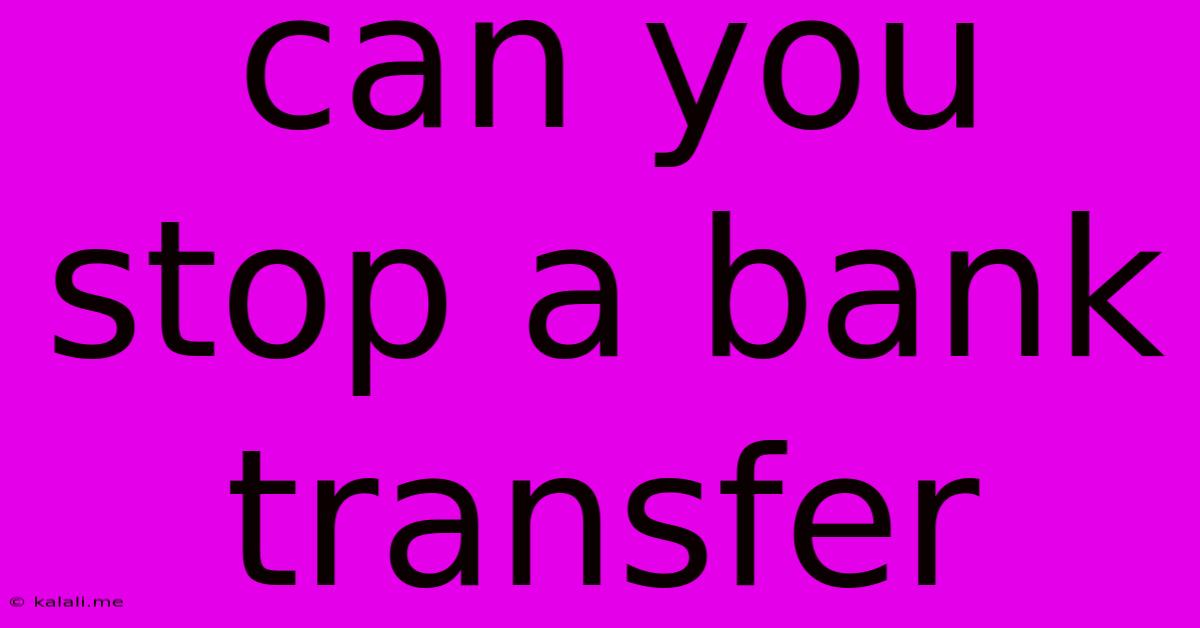Can You Stop A Bank Transfer
Kalali
May 20, 2025 · 3 min read

Table of Contents
Can You Stop a Bank Transfer? A Comprehensive Guide
Stopping a bank transfer can feel like a race against time, especially if you've sent money to the wrong account or discovered a fraudulent transaction. This guide will explore the possibilities and limitations of stopping a bank transfer, depending on the type of transfer and the stage it's in. Understanding the process is crucial for mitigating financial losses.
Understanding the Speed of Bank Transfers
The feasibility of stopping a bank transfer hinges largely on its speed. Faster payment methods like Faster Payments (UK), ACH transfers (US), and real-time payments systems internationally leave little room for intervention once initiated. Traditional bank transfers, often taking several business days to process, offer a slightly larger window of opportunity.
Methods to Stop a Bank Transfer:
The success of stopping a transfer depends heavily on the speed of the transfer method and your bank's policies.
1. Contact Your Bank Immediately: The First and Most Crucial Step
This is paramount. Explain the situation clearly and concisely. Provide all relevant details, including the recipient's account information, the transfer amount, and the reason for wanting to stop the payment. The quicker you act, the higher the likelihood of success.
2. Different Transfer Types, Different Outcomes:
-
Faster Payments/Real-time transfers: These are notoriously difficult to recall. Your bank might be able to contact the receiving bank to request a refund, but success is not guaranteed. The receiving bank might have already processed the funds.
-
Standard Bank Transfers (Domestic): These generally offer a better chance of cancellation, particularly if the transfer hasn't yet cleared. Your bank will attempt to recall the payment, but this depends on several factors, including the receiving bank's cooperation.
-
International Bank Transfers: These are the most complex to stop. International regulations and differing banking systems make recall significantly more challenging and time-consuming. Expect delays, and success isn't guaranteed.
3. The Role of Fraudulent Transactions:
If the transfer was the result of fraud (e.g., unauthorized access to your account), your bank's responsibility to act is far greater. They are obligated to investigate and assist in recovering your funds. Report the fraud immediately and provide them with any supporting evidence you have.
4. The Importance of Proof:
Having documented proof of the error or fraudulent activity is crucial. This could include screenshots, email confirmations, or transaction details. This evidence strengthens your case when contacting your bank.
5. Understanding Limitations:
Even with swift action, there's no guarantee you'll be able to stop a bank transfer. Several factors determine the outcome:
- The receiving bank's policies: They might not cooperate in recalling the funds.
- The transfer's processing stage: Once the funds are credited to the recipient's account, recovery becomes incredibly difficult.
- The type of bank transfer used: Faster payment systems offer minimal chances of cancellation.
Preventing Future Issues:
Preventing future problems requires careful attention to detail:
- Double-check recipient details: Carefully verify account numbers and names before initiating a transfer.
- Utilize secure payment methods: Use reputable platforms and services.
- Regularly review bank statements: This helps detect unauthorized transactions promptly.
- Implement strong password security: Protect your online banking access with robust passwords and two-factor authentication.
Stopping a bank transfer is not always possible, but acting quickly and providing your bank with all necessary information significantly increases your chances of a successful resolution. Remember, prevention is always better than cure. By taking precautionary measures, you can minimize the risk of needing to stop a payment in the first place.
Latest Posts
Latest Posts
-
Can The Snakes On I M A Celeb Bite
May 21, 2025
-
How Long Can Ham Stay Out Of The Fridge
May 21, 2025
-
When To Travel With Newborn By Car
May 21, 2025
-
Language In The Passion Of Christ
May 21, 2025
-
How Long Does Uht Milk Last
May 21, 2025
Related Post
Thank you for visiting our website which covers about Can You Stop A Bank Transfer . We hope the information provided has been useful to you. Feel free to contact us if you have any questions or need further assistance. See you next time and don't miss to bookmark.